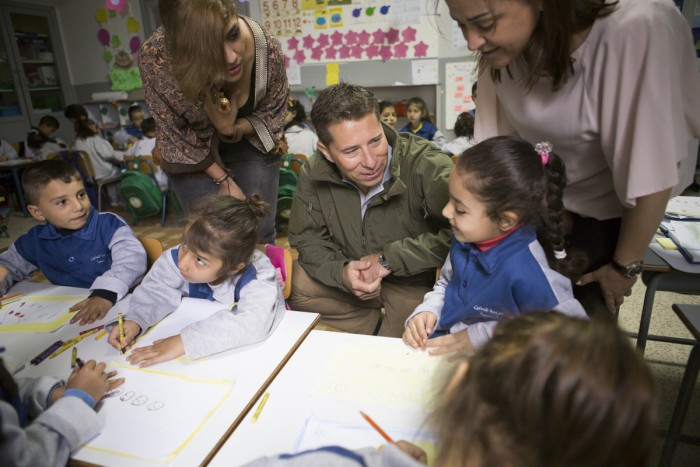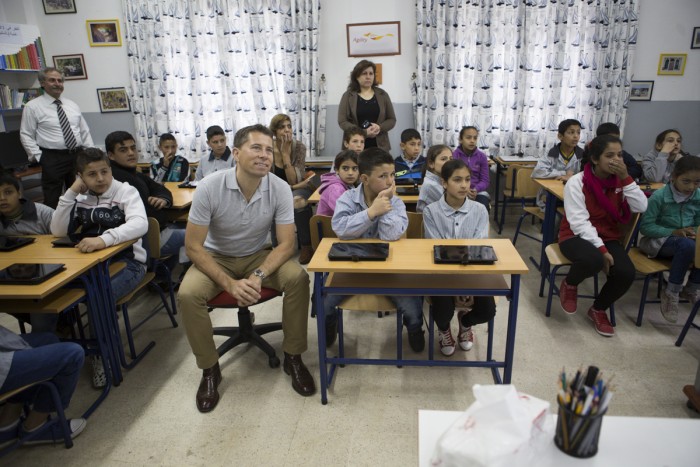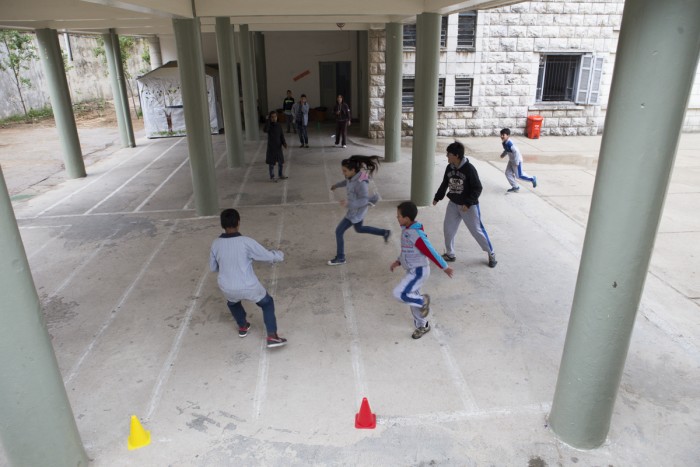Tom Fletcher Witnesses Education Transforming Syrian Refugee Children’s Lives

Photos by Tabitha Ross/A World at School.
Recently, I visited Amman and Beirut where I witnessed first-hand the power of education to transform and invigorate the lives of children who have lost nearly everything save the shirts on their backs. Education was, and remains, the primary catalyst that propelled the families of Syrian refugee children across dangerous waters and forced them to make impossible choices simply to access safer homes in foreign countries like Jordan and Lebanon. For refugee children, accessing education can mean the difference between spending the rest of their childhoods working twelve hours a day and learning the skills they need to go back to Syria and rebuild their country.
As the UK Ambassador in Lebanon for four years, I was involved in the diplomatic effort to stop the war in Syria. We failed to do so, with the grim consequences that continue to evolve, including risking losing an entire generation to war.
Now, as the Global Strategy Director of GBC-Education, I am determined that children fleeing conflict in the Middle East and beyond receive the education they so desperately deserve and crave. Imagine the 1 million Syrian children whose education GBC-Education members like NRS International, ITWORX Education, Kano, and Discovery Learning Alliance are supporting ten years from now, with their schooling behind them: teachers, doctors, architects, psychologists, parents. The builders of a new Syria. The potential is such that I despair to imagine them in ten years without education.

Tom Fletcher at the Mtein School.
Soon, the Education Cannot Wait fund will be launched at the World Humanitarian Summit in Istanbul. Through the crucial support of private sector contributors, the new fund will help millions of children who are deprived of schooling because of emergency situations like wars, natural disasters, and health crises. As it stands now, the goal of the fund is to raise almost $4 billion to reach 13.6 million children within five years, and 75 million children by 2030.
Compared with this global vision, the goal of getting 1 million Syrian refugee children into school that GBC-Education has set for the private sector may seem a modest aim. But the challenge is immense. In Lebanon, the government is working at an extraordinary pace to get all children aged 5-17 into school by the end of the next school year. So far the Ministry of Education has delivered transformational results, helping over 200,000 Syrian refugee children enroll in formal school to-date. In Jordan, partnerships between government and business are aiming to just about match this success.

Students at the Mtein School playing.
At Lebanon’s Mtein Public Primary School I met tireless director, Mrs. Najah Banna, who told me about the challenges of operating the double-shift system through which some of the country’s Syrian refugee children have access to formal education. She told me that many children arrive at school already hungry, so now the school, supported by Theirworld, offers pupils milk and healthy snacks to boost their capacity to learn (and to beat visiting ex-envoys in arm wrestles). I also learned that many Arabic-speaking Syrian refugee children struggle to adapt to math and science curriculums taught in foreign French or English. But through the critical support of companies like HP, Crescent Petroleum, and RELX Group, some children are lucky enough to receive language-learning tools that ensure that their access to school is not in vain.
In Lebanon and Jordan, I also met other business leaders who have taken on this challenge as theirs, representing the generational struggle to avoid a lost generation. Their ingenuity and drive for results could fill the gap that governments and NGOs fail to fill themselves. It is comforting that business leaders’ support is only one moving piece amid the shifting landscape of humanitarian action, where we continue to see the disruption of classic education models through the support of innovative partnerships. Looking forward to the World Humanitarian Summit, GBC-Education anticipates reporting back on how the private sector is stepping up action, building on the $75 million-equivalent of support announced at the Supporting Syrian and the Region conference in February.
Now, I call on business to work in partnership with donor governments to do their part to support the Education Cannot Wait fund so the next time a crisis strikes, the dreams and opportunities of millions of children are not squandered.
